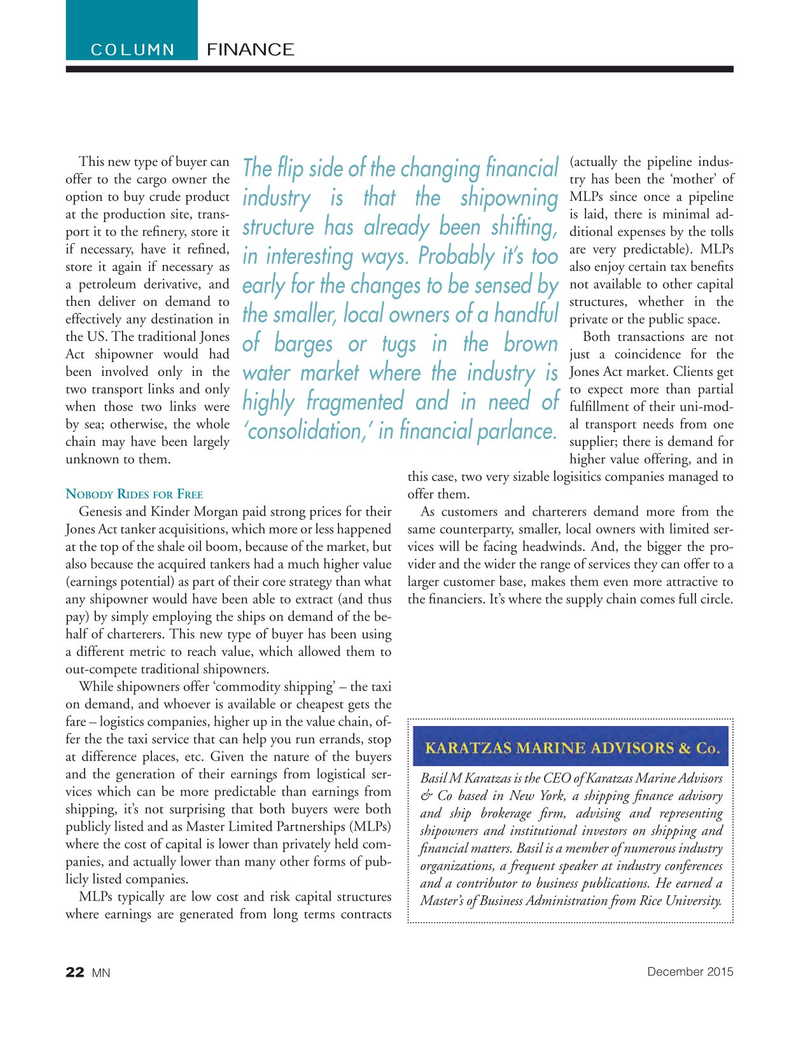
Page 22: of Marine News Magazine (December 2015)
Innovative Products & Boats of 2015
Read this page in Pdf, Flash or Html5 edition of December 2015 Marine News Magazine
COLUMN FINANCE
This new type of buyer can (actually the pipeline indus-
The ? ip side of the changing ? nancial offer to the cargo owner the try has been the ‘mother’ of option to buy crude product MLPs since once a pipeline industry is that the shipowning at the production site, trans- is laid, there is minimal ad- structure has already been shifting, port it to the re? nery, store it ditional expenses by the tolls if necessary, have it re? ned, are very predictable). MLPs in interesting ways. Probably it’s too store it again if necessary as also enjoy certain tax bene? ts a petroleum derivative, and not available to other capital early for the changes to be sensed by then deliver on demand to structures, whether in the the smaller, local owners of a handful effectively any destination in private or the public space.
the US. The traditional Jones Both transactions are not of barges or tugs in the brown
Act shipowner would had just a coincidence for the been involved only in the Jones Act market. Clients get water market where the industry is two transport links and only to expect more than partial highly fragmented and in need of when those two links were ful? llment of their uni-mod- by sea; otherwise, the whole al transport needs from one ‘consolidation,’ in ? nancial parlance.
chain may have been largely supplier; there is demand for unknown to them. higher value offering, and in this case, two very sizable logisitics companies managed to
OBODY IDES FOR REE
N R F offer them.
Genesis and Kinder Morgan paid strong prices for their As customers and charterers demand more from the
Jones Act tanker acquisitions, which more or less happened same counterparty, smaller, local owners with limited ser- at the top of the shale oil boom, because of the market, but vices will be facing headwinds. And, the bigger the pro- also because the acquired tankers had a much higher value vider and the wider the range of services they can offer to a (earnings potential) as part of their core strategy than what larger customer base, makes them even more attractive to any shipowner would have been able to extract (and thus the ? nanciers. It’s where the supply chain comes full circle.
pay) by simply employing the ships on demand of the be- half of charterers. This new type of buyer has been using a different metric to reach value, which allowed them to out-compete traditional shipowners.
While shipowners offer ‘commodity shipping’ – the taxi on demand, and whoever is available or cheapest gets the fare – logistics companies, higher up in the value chain, of- fer the the taxi service that can help you run errands, stop at difference places, etc. Given the nature of the buyers and the generation of their earnings from logistical ser-
Basil M Karatzas is the CEO of Karatzas Marine Advisors vices which can be more predictable than earnings from & Co based in New York, a shipping ? nance advisory shipping, it’s not surprising that both buyers were both and ship brokerage ? rm, advising and representing publicly listed and as Master Limited Partnerships (MLPs) shipowners and institutional investors on shipping and where the cost of capital is lower than privately held com- ? nancial matters. Basil is a member of numerous industry panies, and actually lower than many other forms of pub- organizations, a frequent speaker at industry conferences licly listed companies.
and a contributor to business publications. He earned a
MLPs typically are low cost and risk capital structures
Master’s of Business Administration from Rice University.
where earnings are generated from long terms contracts
December 2015 22 MN
MN Dec15 Layout 18-31.indd 22 11/24/2015 9:55:48 AM

 21
21

 23
23
